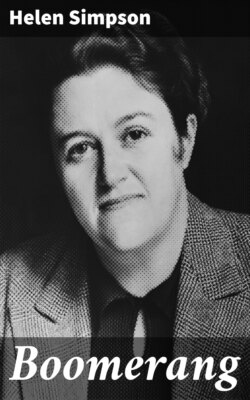Читать книгу Boomerang - Helen Simpson - Страница 4
На сайте Литреса книга снята с продажи.
CHAPTER I
ОглавлениеTable of Contents
But remembering the early civility they brought upon these countreys, and forgetting long passed mischiefs; we mercifully preserve their bones.
--Religio Medici.
Life can afford extravagance, books cannot; for this reason nobody will dream of believing in my two grandfathers. They are too true to be good--good fiction, at any rate; if I try to give some kind of picture of them, it is because they frame between them a vision of a golden age, which could only have existed in brand-new countries, among brand-new circumstances and laws. It was not a golden age for everybody, wives or servants for instance, but for these two it was; they were, to use a word which is almost dead, characters.
I am sorry to think what would happen to these two old gentlemen if they had the misfortune to live now; it would be something legal, that is certain, falling heavily to crush their magnificent egotism and eccentricity. Their wives, who in the 'seventies put up with them with the uncomprehending patience accorded by Insurance Companies to Acts of God, would nowadays divorce them. Servants would bring, and win, actions against them for assault. As for their families, these would scatter immediately after the first row or two, and go forth to earn their livings with all the horrid freedom that the post-war period accords. In an age of standardisation these old crusted, crusty gentlemen, mellow even in their rages as the Madeira which they sent for a roll round the Horn before bottling, would have the deuce of a time.
Doctors, to begin with, who in the last half century have swelled up into demi-gods, would be the first to interfere. They would view the couple, with their picturesquely flushed faces, their sudden wraths after meals, as mere examples of treacherous glands, and hardening arteries. (Character is a word which has died from the doctors' vocabulary too.) They would accept five-guinea fees to persuade the old gentlemen that what they needed was calm; and there would be a great recommending of suitable institutions--"quite in the country, you know, cooking not bad, and just supervision, nothing irksome." When the doctors had done, the lawyers would take their turn. Death duties, they would tell their victims, could best be avoided by making over the estate during lifetime to a reliable son. Relatives would then appear, with hints, backed by statistics, concerning vegetarian diet, and the undesirability of port by the pint twice a day. And at last, having shorn the bewildered unfortunates, for their own good, of home, money, wine and liberty, the twentieth century would turn the key on them with a sigh of genuine relief.
There was none of this in the colonies of last century, which was, for the tyrants, the very grandest imaginable time. There were doctors, true, and lawyers, but they were kept in their place, and the tyrants used them. Land was for the asking. Convicts were done with, to everybody's relief--the last batch reached Sydney in 1840; but there was labour to be had, labour which, like the doctors and lawyers, knew its place, and took its wage with a finger to the forelock. There were English immigrants who came after gold, and remained to use spade and shears. There were Chinese in numbers, who came, as they explained by an interpreter to astonished immigration officers, to earn prouder lacquered coffins in this rich new land than their own exhausted paddy-fields could yield them. (The price of the coffin once safe in a canvas bag, they broke their term of service and returned to China assured of respect.) To deal with the land and the labour, a great many laws were made, and printed, and forgotten on shelves; while on the land existed superbly a number of men and women who were laws to themselves; characters, obeyed as such, loved, feared, and occasionally murdered as such. And here we come upon those prime old personages, ripe and shocking and satisfying as good Stilton cheese, the despair of their families and neighbours, and worth the lot put together; Great-grandfather Boissy, and his son, Gustave-Félicité.
I may say at once that I never knew either.
